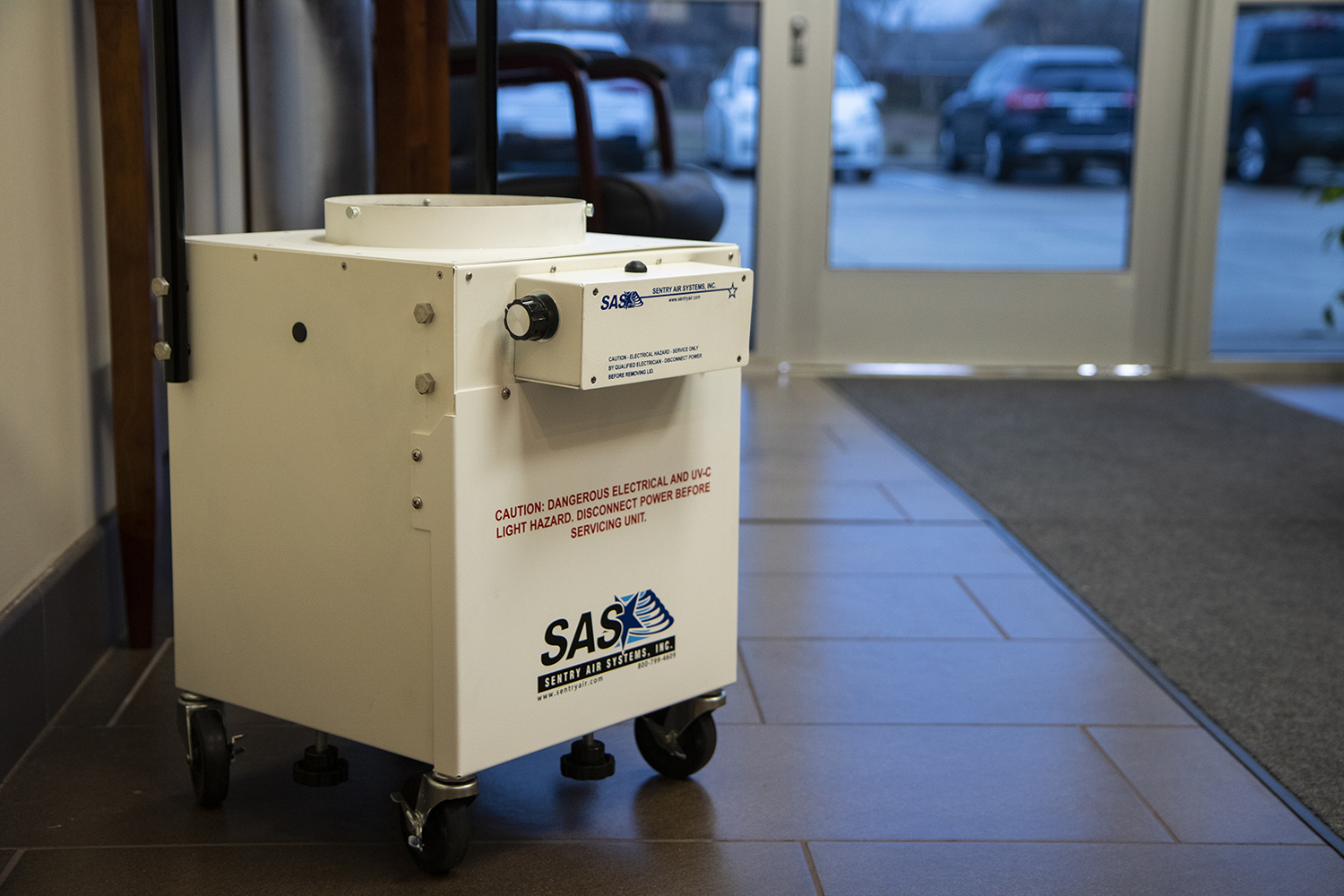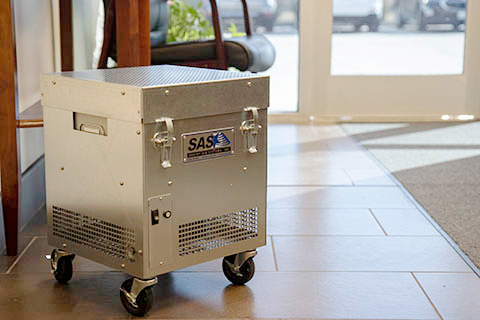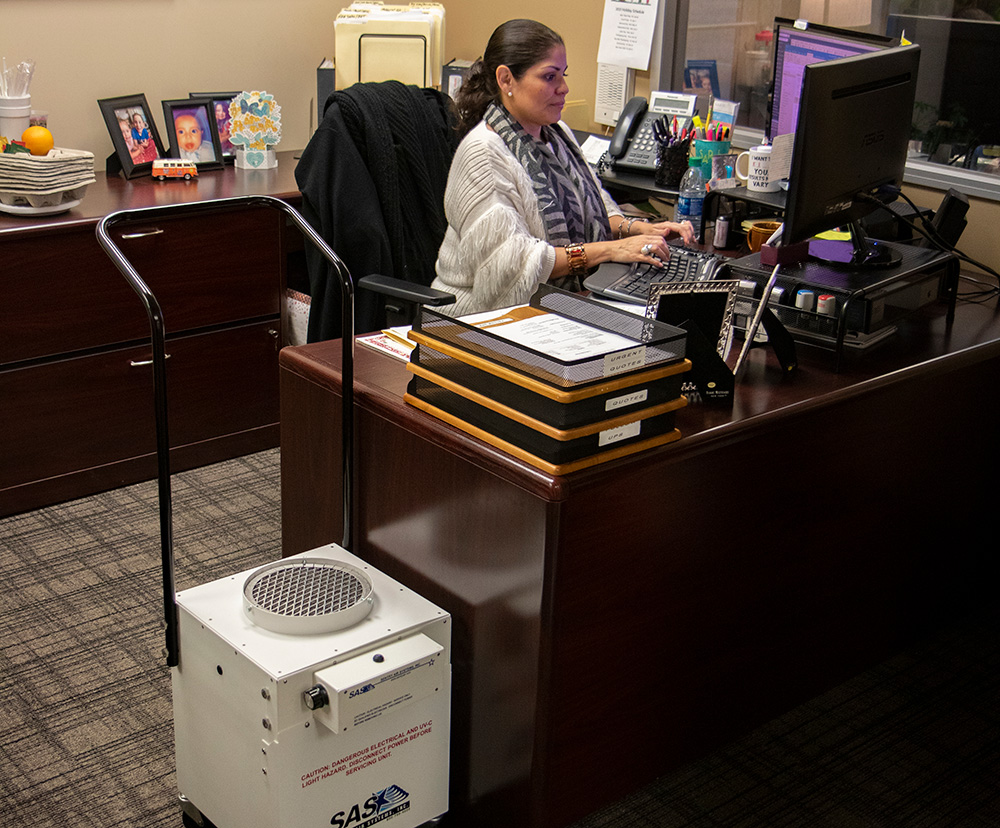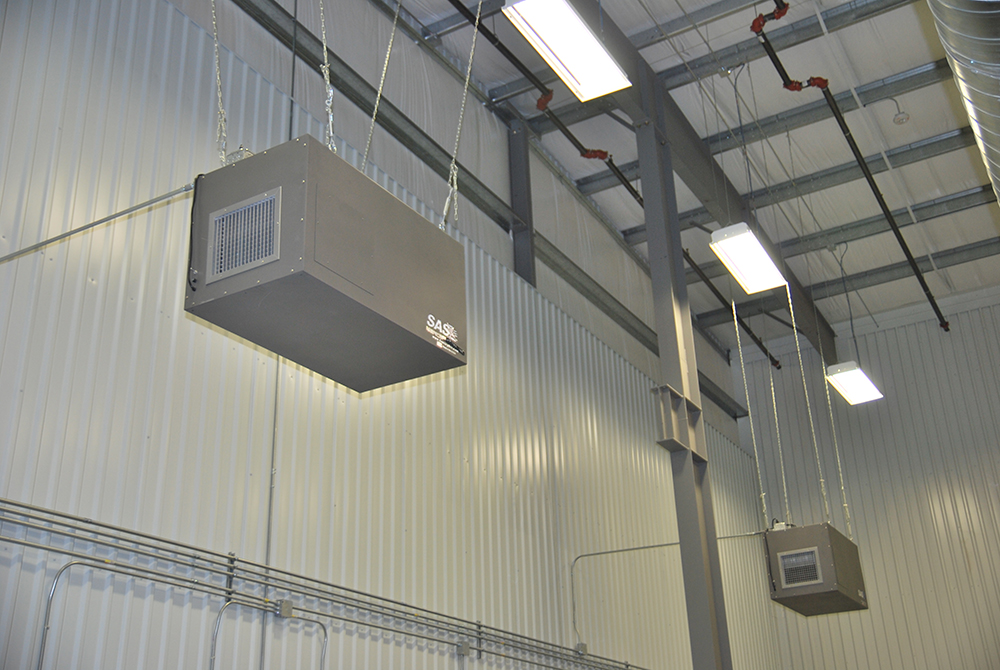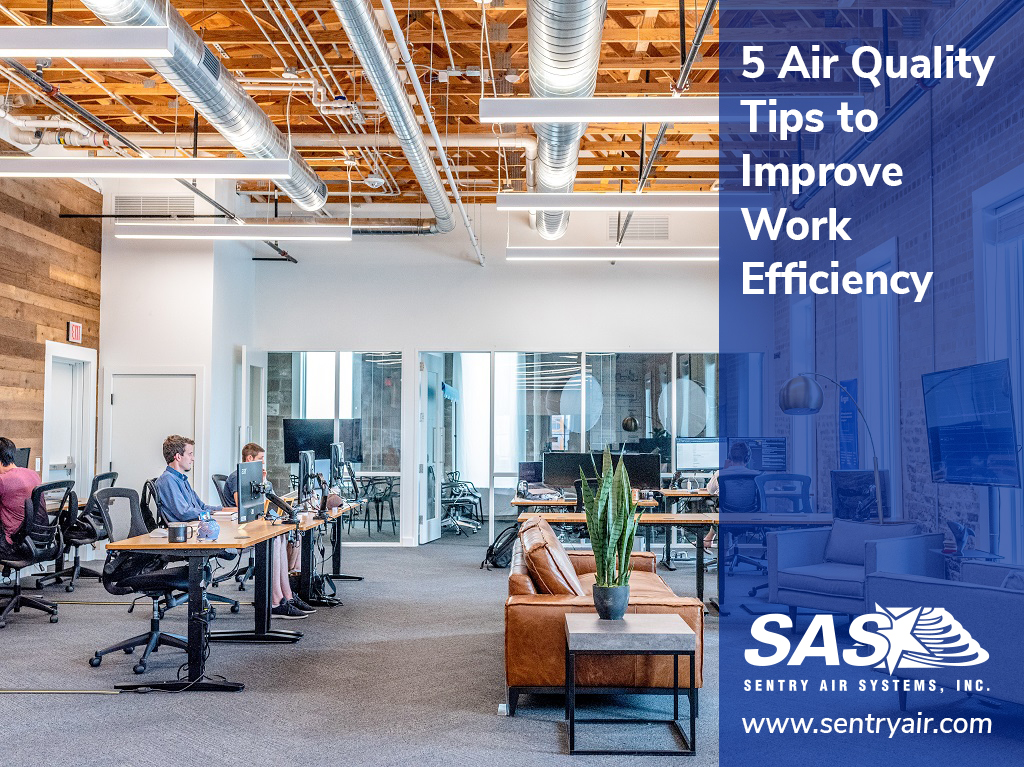
Do you know why it is important to increase the air quality in the workplace…
…because when air quality is improved, work efficiency improves. This is mostly due to the decrease in health conditions caused by compromised air.
Air quality decreases when levels of contaminants accumulate faster than they can be ventilated or eliminated; and while there are many ways to reduce the amount of particulate, the following air quality tips will help improve the air quality in your working environment:
Air Quality Tip #1 — Place furniture and equipment strategically.
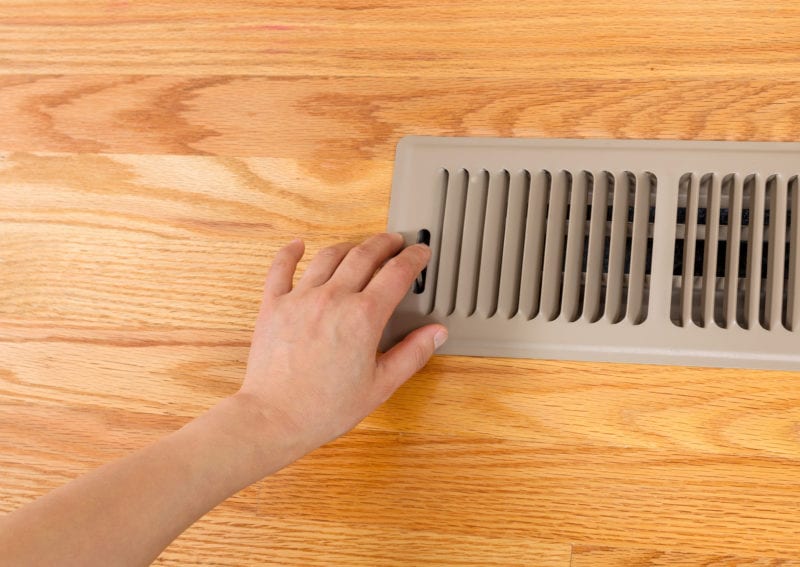
Ensure that air vents are not blocked. (Source)
In order to allow for proper indoor ventilation, be sure to not block air vents or grilles. The use and placement of furniture and equipment may affect the delivery of air to an indoor space. Furniture or partitions should not be placed to block supply or return air registers as this can affect indoor air quality (IAQ).
Air Quality Tip #2 — Implement preventative measures to avoid mold growth.
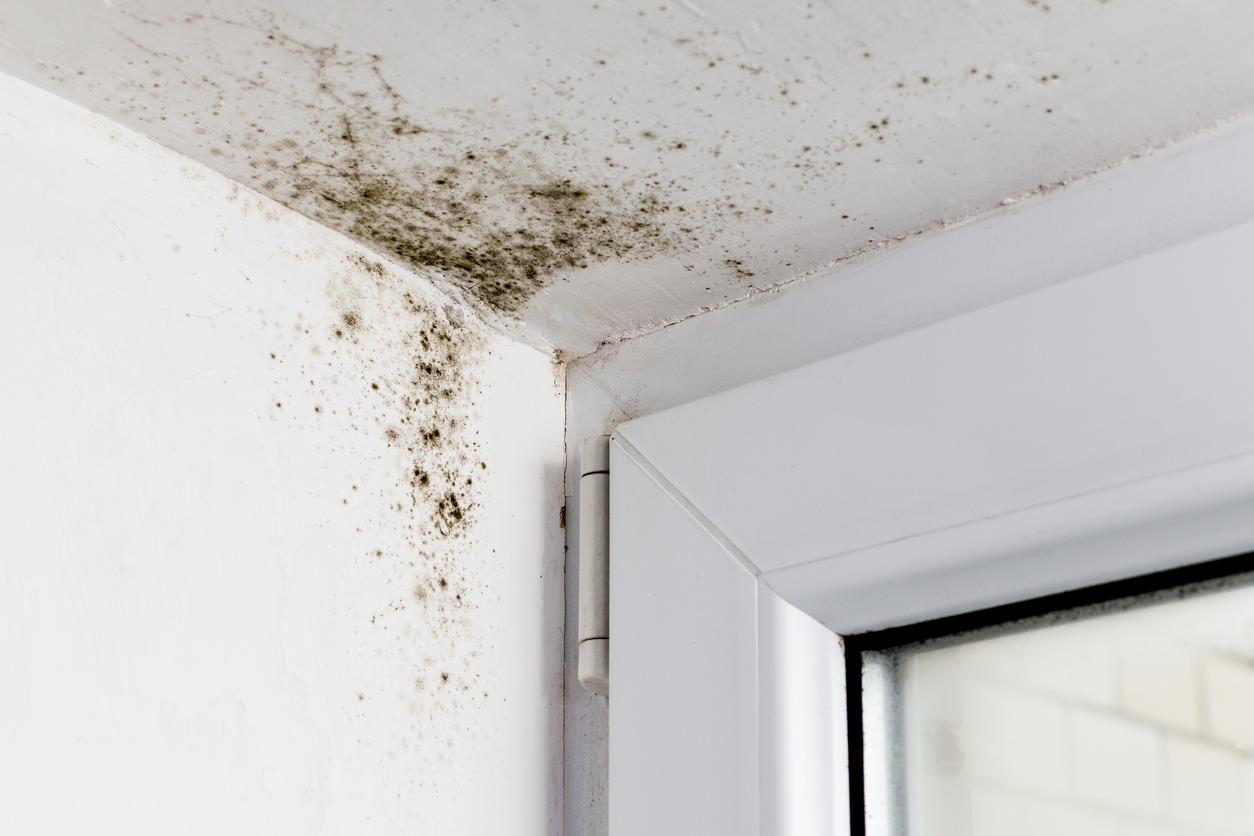
Maintain proper ventilation and reduce moisture to help prevent mold growth. (Source)
Mold growth, caused by moisture, oxygen, and a source of “food”, can negatively affect the IAQ of your working environment. The most effective way to prevent mold growth is to prevent moisture by maintaining proper ventilation, using UV Lights, and adding mold inhibitors to paint to effectively protect and prevent the growth of molds on the walls of your building.
Air Quality Tip #3 — Maintain a clean work environment by cleaning, dusting, and vacuuming regularly.
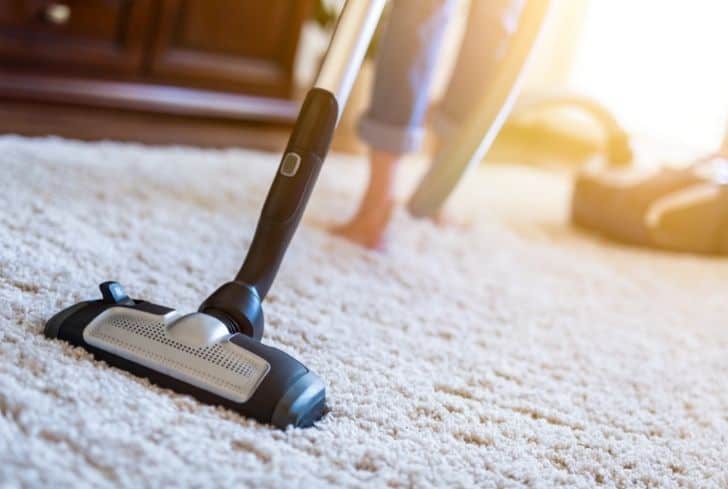
Vacuum, clean, and dust regularly. (Source)
An easy way to improve the quality of air in the workplace is to maintain a clean work environment. Keeping the space clean decreases the particulates and toxins in an indoor area, thus improving the IAQ.
Air Quality Tip #4 — Schedule routine HVAC Equipment Maintenance.
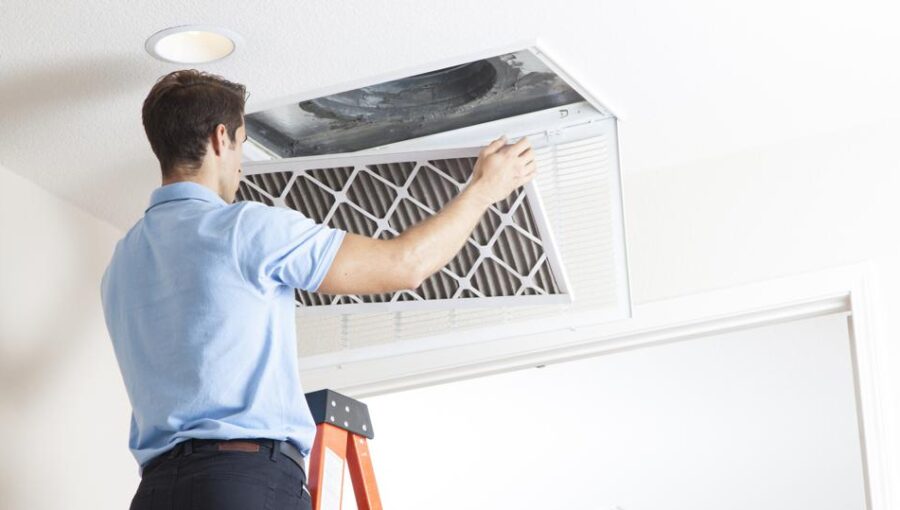
Conduct regular HVAC maintenance including changing filters and cleaning air ducts by a professional. (Source)
HVAC Systems need regular maintenance in order to run optimally. Having a maintenance plan in place not only provides immediate benefits but will also reduce the chance of future issues developing. Two maintenance items that are vital to not only the lifespan of your HVAC equipment but also will contribute to the quality of indoor air are replacing HVAC filters regularly and having air ducts cleaned professionally.
– Replace HVAC Filters Regularly.
HVAC filters trap particles such as dust, debris, and dirt, as air cycles through intakes and out vents. When air filters are clogged with particulates, your HVAC system not only has to work harder to maintain comfortable temperatures, but also does not optimally ventilate your indoor space.
How often air filters need to be replaced depends on several factors such as:
● Type of air filter
● Size of space
● Indoor air pollution levels
While most manufacturers recommend replacing standard air filters every 30 to 90 days, it is important to take into consideration the contributing factors when deciphering how often to replace filters in your place of business. If you are unsure, remove the filter and hold it up to the light. If you are unable to see through the material, the filter needs to be replaced.
– Have Air Ducts Cleaned Professionally
Air duct cleaning prevents the build-up of dust and particles from building up inside the HVAC system, helping to improve IAQ. In most cases, air ducts need to be cleaned every three to five years, but this timing depends on factors such as region, how often the HVAC system is used, etc.
Air Quality Tip #5 — Invest in cleaner air
Investing in clean air solutions can dramatically improve indoor air quality. These systems draw in airborne fumes and particulate and remove them from the airflow using high-quality filtration. Sentry Air’s Industrial Air Cleaners help improve air quality by filtering out toxins, contaminants, and other particulates, thus providing a more efficient working environment for employees and customers. These air filtration systems use HEPA and/or Activated Carbon filters to remove harmful contaminants and redistribute clean air back into the workspace.
Air Quality Solutions
Portable Air Cleaner
The Model 300 AirGuardian Portable Air Cleaner is a compact, self-contained air filtration system used to assist in the removal of hazardous airborne microorganisms and particulates out of the work area improving indoor air quality. This highly efficient air cleaner utilizes a powerful fan that pulls in air along with high-quality filters such as HEPA filters or ULPA that redistributes clean air back into the area. This durable filtration system can benefit any size space and is energy efficient, quiet, and uses very little power to operate.
Best Use: filtering fumes, vapors, and particulates from the ambient air in spaces where ducting and oversized ventilation is not sufficient
Benefits:
● Quiet Operation
● Reliable
● Low Maintenance Operation
● Low Power Consumption
● Simple, Quick Filter Change
● Long Filter Life
Filters Available: HEPA, ASHRAE, ULPA, activated carbon, and specialty-blended filter media
Commercial UV Air Purifier (AirGuardian Pro)
The Model 300 UVC Room Air Cleaner uses proven germicidal UVC light for air disinfection. This air purifying system provides additional defense against microorganisms such as bacteria and viruses. Airborne particles, including dust, particulates, fumes, and microorganisms are pulled into a filtration chamber. The pre-filter removes larger airborne particles, then the main filter (HEPA or ULPA Filter) captures the remaining airborne contaminants before recirculating the cleaned air back into the room. The UVC light disinfection cycle used in this system uses a germicidal wavelength of UVC light that removes bio-hazard accumulation through the filter process. UVC light damages the organisms’ DNA or RNA thus inactivating the microorganism. The Model 300 UVC Room Air Cleaner helps provide cleaner indoor air in a variety of applications including labs, doctors’ offices, waiting rooms, hospitals, nail salons, etc. This energy efficient system is easily portable, operates quietly, and is incredibly easy to maintain and change filters.
Best Use: improving IAQ and providing protection from bacteria, viruses, and germs through the use of UV-C
Benefits:
● Eliminates bacteria and viruses from the air
● Does not require the use of harsh chemicals
● Quiet operation
● Reliable
● Low maintenance
● Energy efficient
● Long filter life
Filters Available: HEPA and ULPA
Ambient Air Cleaner (2000 Series)
The Model 2000 Free-Hanging Air Cleaner is a high efficiency dual-stage industrial air filtration system that draws contaminated air from the air and redistributes filter air through the use of a set of air filters that assist in removing harmful toxins and particulates in the air. These air cleaning units can be utilized in large areas such as shops, warehouses, or other highly populated areas needing secondary air filtration. The Model 2000 Free-Hanging Air Cleaner is self-contained and can be mounted multiple ways: hung from the ceiling, on a fume extractor stand, or set on a flat surface. This unit is typically used in welding workshops, automotive shops, manufacturing areas, wood shops, along with many additional applications. It can be used for general air cleaning in spaces such as offices, cafeterias, sports facilities, or other spaces where IAQ is a concern for the safety and well-being of occupants. This air cleaner is easy to operate and maintain, has low power consumption, and long filter life.
Best Use: filtering environmental toxins, contamination, and particulates and recirculated filtered air through a set of highly efficient air filters from large areas such as shops, warehouses, or other highly populated
Benefits:
● Long filter life
● Reliable
● Low maintenance operation
● Low power consumption
● Quiet operation
● Simple, Quick Filter Change
Filters: Dual stage filtration (MERV 8 pre-filter and MERV 15 main bag filter)
Help improve workplace air quality with high quality air cleaners from Sentry Air!
Contact us today to get started – 713.690.2153 | 1.800.799.4609
Related Blogs
• Improving Ventilation and Air Filtration to Help Prevent COVID Transmission in the Workplace
• Understanding Your Indoor Air Quality

 Made in the USA
Made in the USA
